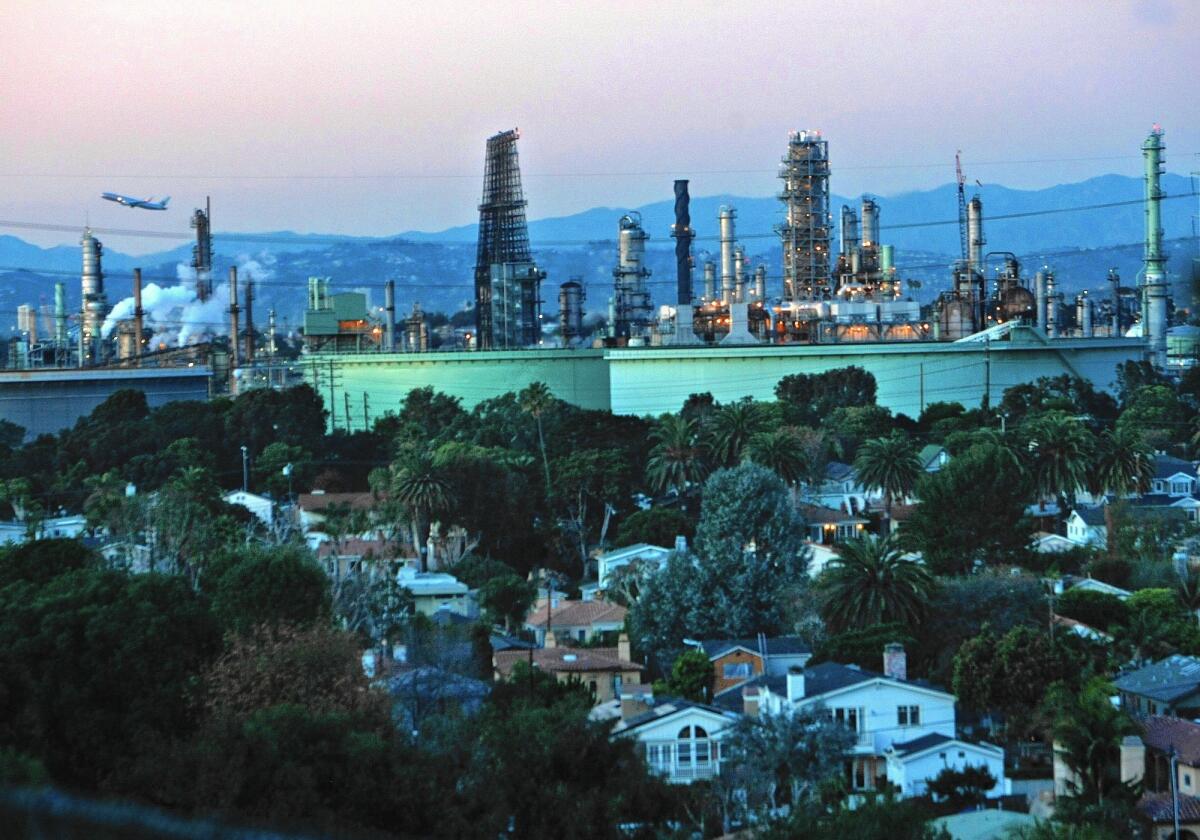State air board criticizes Southern California smog regulators over adoption of industry-backed rules

- Share via
The state Air Resources Board has criticized Southern California smog regulators for adopting industry-backed regulations to control emissions from the region’s largest facilities, saying they may violate state law and will harm people’s health.
The state says it has “serious concerns” about the South Coast Air Quality Management District board’s 7-5 vote last month in favor of a plan by the Western States Petroleum Assn. and other business interests to cut fewer smog-forming pollutants from oil refineries, power plants, factories and other major sources — and at a slower pace than proposed by the district’s staff.
The South Coast board’s Dec. 4 decision to adopt a weaker smog rule came at a time when the region “needs every ton of achievable reductions to attain healthy air,” California Air Resources Board Executive Officer Richard W. Corey wrote in a letter to regional regulators this week.
“This action will negatively affect the health of people living in the region because it falls short of what is needed” and does not fulfill the air district’s obligations to clean the air to meet health standards as quickly as possible, Corey wrote.
The air board’s regulations also “do not appear to meet the minimum emissions control requirements in California law,” Corey wrote, adding that his staff believes the plan could not be approved by the state or submitted to the U.S. Environmental Protection Agency.
South Coast air quality Chairman William A. Burke defended the board’s action, saying the 13-member panel is “not constituted to rubber stamp staff suggestions.”
“I will be concerned about it when it is drawn into court and adjudicated,” added Burke, who voted in favor of the regulations adopted and said he had not yet reviewed the letter from the Air Resources Board. “Any judge worth his salt will approve this plan.”
In what was intended to be its biggest smog-fighting regulation in a decade, the South Coast air district’s staff had proposed overhauling its decades-old cap-and-trade program, known as the Regional Clean Air Incentives Market, or RECLAIM. The program regulates emissions of nitrogen oxides that generate ozone and other lung-damaging air pollutants.
Under the program, regulators set a limit on emissions from some of Southern California’s largest air pollution sources and allocate each facility pollution credits. Operations with cleaner emissions can sell their credits to those whose emissions exceed the limits. Regulators gradually reduce the number of credits available to force pollution reductions over time.
But in recent years the program has not worked as intended. An oversupply of credits has made it easier for businesses to buy rights to pollute than to spend money on better controls.
As a result, oil refineries in the nation’s smoggiest region have been slow to install pollution-scrubbing equipment. Nitrogen oxide emissions from facilities regulated under the program have remained flat in recent years, even as the region has missed a series of deadlines to meet federal clean-air standards.
In the December vote, the board rejected the staff’s proposal to fix those problems with a 14-ton-per-day reduction in the cap on nitrogen oxide emissions by 2022.
Instead, the air board opted to cut only 12 tons over the same period, and more slowly. Board members cast their votes after being warned by their staff that the weaker rule may not be legally defensible in California and would delay the installation of emissions controls.
The decision came after vigorous opposition by industry groups that have argued that steeper, faster cuts would force refineries and other facilities to spend billions upgrading pollution controls.
Environmentalists and community groups had urged the board to adopt stronger pollution-cutting requirements to help ease asthma and other smog-related health problems.
Bill Magavern, policy director for the Coalition for Clean Air, said Friday that “this is an illegally weak standard and we’re glad that the Air Resources Board is stepping in to say this decision will not stand.”
The South Coast air district, which is responsible for protecting the health of 17 million people across Los Angeles, Orange, Riverside and San Bernardino counties, has indicated it is considering further changes to the RECLAIM program, according to the Air Resources Board’s letter.
State Senate leader Kevin de León (D-Los Angeles) said the air district “should quickly revisit its decision and ensure their programs comply with the Clean Air Act and protect the air we breathe in Southern California,” adding that “their abdication of responsibility will have serious consequences.”
Twitter: @tonybarboza







